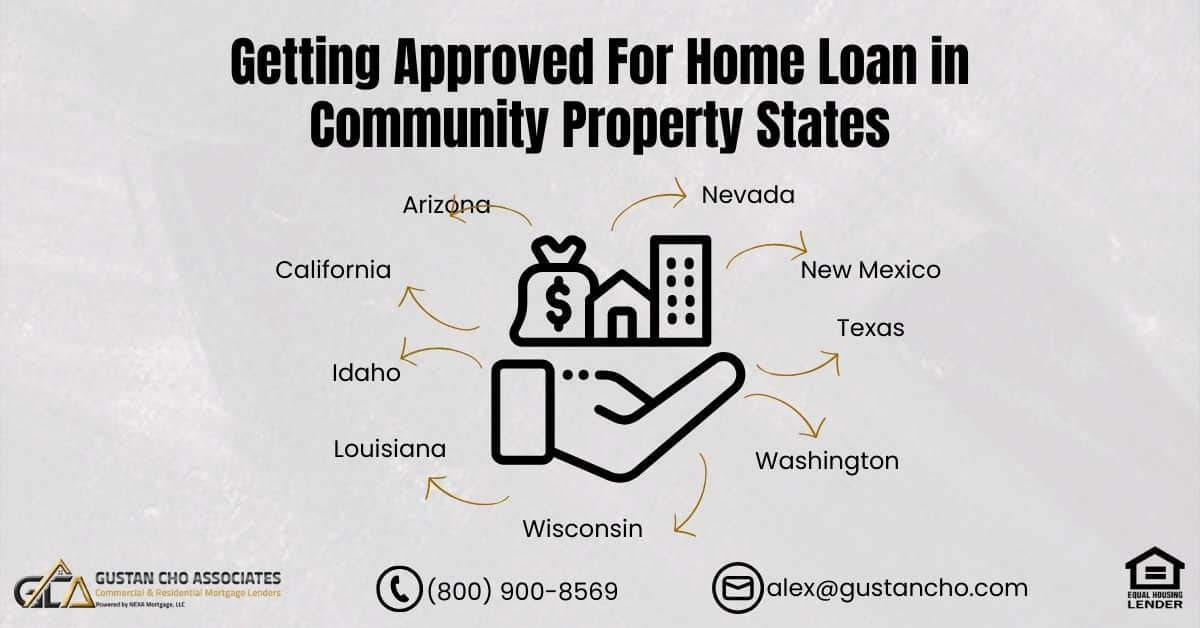This guide delves into Getting Approved For Home Loan in Community Property States process. Specific requirements must be met when purchasing a home loan and applying for a home loan in certain states. Married couples seeking government-backed home loans in community property states face distinct considerations.
Dale Elenteny, a senior mortgage advisor at Gustan Cho Associates, points out that Fannie Mae and Freddie Mac do not consider the non-borrowing spouse’s debt-to-income ratio when considering conventional home loans in these states.
An applicant for a Fannie Mae mortgage with a 740 FICO score will pay thousands less for the same loan than an applicant with a 640 FICO. So if the main earner in a marriage also has a higher credit score, it can make sense to leave the other spouse off the loan. It may even be necessary to leave a spouse off if his or her credit score is too low for loan eligibility.
Understanding the intricacies of home loan in community property states is essential before diving into the mortgage application process. In these states, opting for a conventional home loan presents a unique advantage: the debts of non-borrowing spouses are not factored into the debt-to-income ratio.
This exclusion can significantly impact your loan eligibility and borrowing capacity, offering greater flexibility for couples purchasing property together. However, it’s crucial to note that this favorable treatment doesn’t extend to government-backed loans such as FHA, VA, and USDA loans, where all debts, including those of non-borrowing spouses, are considered in the application process.
Thus, individuals navigating a home loan in community property states must carefully weigh their options and consider the implications for their specific financial situation.
While conventional home loans offer certain advantages in community property states, it’s imperative to recognize that alternative financing options may better suit individual circumstances. FHA, VA, and USDA loans offer advantages like lower down payments and relaxed credit score standards.
However, applicants must understand that in these cases, all household debts, regardless of the borrower’s status, are factored into the loan assessment process. Couples considering a mortgage should research thoroughly and seek advice from a qualified financial advisor to find the best loan product for their needs and financial goals.
In community property states, the rules governing the allocation of assets and debts for married couples seeking a home loan in community property states are distinct. These regulations influence property title ownership and can impact the mortgage application process.
In such states, assets and debts accrued during marriage are considered joint property, making it more challenging to exclude one spouse from the title or loan application to meet financing requirements. The nine community property states in the US, including Arizona, California, Idaho, Louisiana, Nevada, New Mexico, Texas, Washington, and Wisconsin, adhere to these regulations.
For those applying for FHA, VA, or USDA Home Loans in community property states while married, their spouse’s debts are factored into the debt-to-income ratio calculation. It’s important to note that this rule does not apply to conventional loans.
Applying for a Mortgage in a Community Property State
Navigating securing a home loan in community property states can present unique considerations, particularly when opting for government-backed financing. In such states, like those adhering to community property laws, lenders are mandated to scrutinize the financial standing of both spouses, even if only one is formally applying for the home loan.
This means that both individuals’ debts and credit histories may be reviewed, potentially impacting the loan approval process. However, it’s worth noting that conventional lenders offer an alternative avenue, as they typically don’t require disclosing the non-borrowing spouse’s financial information.
Thus, for those who qualify for financing outside government-backed home loans, navigating the borrowing landscape in community property states may prove more manageable.
Buying a Home in a Community Property State? We Know the Rules
Spouse debts, joint liabilities, and community property laws can change how you qualify
Why Leave One Spouse Off the Home Loan in Community Property States?
Why might a couple opt to have only one borrower listed on the title or mortgage of their home? Many couples make this decision if one spouse has poor credit, provided that the other spouse’s income is sufficient for qualification. This is because mortgage lenders must consider the lowest credit score among borrowers when assessing eligibility and determining loan terms.
Another reason for leaving one spouse off the loan is to improve the debt-to-income ratio. Both spouses can be on a home loan in community property states. However, if one spouse does not work but has debts, why include the non-working spouse on the loan and add to the debt-to-income ratio.
Take Ann and Bill, for example. Ann is married to Bill, holds a steady full-time job, maintains a single credit card with monthly payments, and possesses a car she fully owns without any outstanding loans. On the other hand, Bill is currently pursuing a graduate degree and has recently taken up a part-time job.
He carries student loans, multiple credit cards, and an auto loan, with some of his financial obligations covered by a school stipend and contributions from his parents. Given Bill’s significant debt load and the potential difficulty in recognizing his income by underwriters, it makes practical sense for Ann to seek a mortgage in her name alone, ensuring that only her debts are factored into the qualification process.
Guidelines on Government Home Loan in Community Property States
In community property states, the intricacies of home loans carry significant weight, particularly concerning government-backed mortgages. These states mandate that underwriters delve into the financial obligations of both spouses to uphold taxpayer protection.
Under this legal framework, debts incurred by either partner during the marriage become jointly owned responsibilities. Thus, if the non-borrowing spouse defaults on payments, the borrowing spouse could find themselves financially liable. This requirement solely pertains to a government-backed home loan in community property states and does not extend to conventional loan arrangements.
Given these legal nuances, individuals navigating the home loan in community property states must carefully consider their options. Sonny Walton, an esteemed realtor and loan officer at Gustan Cho Associates, suggests that couples facing scenarios where one spouse holds substantial debts without a commensurate income might find conventional loans a more favorable avenue to explore compared to government-backed alternatives:
You can qualify for a conventional home loan in community property states and not have your non-borrowing spouses debts count towards your debt to income ratios. And that could compromise the borrowing spouse’s ability to make the mortgage payment. There are three different types of government-backed home loan in community property states: FHA, VA, and USDA loans.
Furthermore, when scrutinizing loan applications, underwriters for FHA, VA, and USDA loans meticulously examine both spouses’ credit reports. While the non-borrowing spouse’s credit scores may not sway the decision-making process, lenders meticulously evaluate outstanding debts that could amplify the lender’s risk profile.
For instance, the presence of collection accounts vulnerable to legal actions such as lawsuits, judgments, and liens may trigger a rejection of the loan application, emphasizing the importance of thorough financial assessment in such scenarios involving home loan in community property states.
If you have any questions about a home loan in community property states or borrowers who need to qualify for loans with a lender with no overlays on government or conforming loans, please contact us at Gustan Cho Associates at 800-900-8569. Text us for a faster response. Or email us at alex@gustancho.com . The team at Gustan Cho Associates is available 7 days a week, on evenings, weekends, and holidays.
Don’t Let Community Property Guidelines Surprise You at the Last Minute
Many lenders don’t explain this until underwriting—when it’s too late
FAQs on Getting Approved For Home Loan in Community Property States
- 1. What are Community Property States? In community property states, laws govern asset and debt allocation for married couples, impacting property ownership and the mortgage application process. These states, including Arizona, California, Idaho, Louisiana, Nevada, New Mexico, Texas, Washington, and Wisconsin, consider assets and debts accumulated during marriage as joint property.
- 2. How does Community Property Law affect Mortgage Applications? When applying for a home loan in community property states, both spouses’ financial statuses are typically scrutinized, even if only one is applying formally. This means debts and credit histories of both individuals may influence the loan approval process, especially for government-backed loans like FHA, VA, and USDA loans.
- 3. Why Leave One Spouse Off the Home Loan? Couples may opt to exclude one spouse from the mortgage if they have poor credit or minimal income, aiming to improve qualification chances and secure better loan terms. By leaving out the spouse with lower credit or income, the borrowing spouse’s eligibility and debt-to-income ratio may improve, potentially leading to lower interest rates or higher loan amounts.
- 4. What are the Benefits of Conventional Loans in Community Property States? Conventional loans in community property states offer advantages, including the exclusion of non-borrowing spouse’s debts from the debt-to-income ratio calculation. This can enhance loan eligibility and borrowing capacity for couples purchasing property together, providing greater financial flexibility.
- 5. What Should Couples Consider When Choosing Between Conventional and Government-Backed Loans? While conventional loans offer benefits in community property states, government-backed loans like FHA, VA, and USDA loans provide advantages such as lower down payments and relaxed credit score requirements.
- However, it’s essential to understand that all household debts are considered in the loan assessment process for these loans, potentially affecting qualification and terms.
- 6. How do Underwriters Assess Home Loan Applications in Community Property States? Underwriters meticulously review credit reports and outstanding debts of both spouses when evaluating home loan applications in community property states. Collection accounts vulnerable to legal actions, such as lawsuits or liens, may impact the application’s approval, highlighting the importance of thorough financial assessment in these scenarios.
This blog about Getting Approved For Home Loan in Community Property States was updated on February 22, 2024.











Absolutely! Community property states are always a confusing topic for mortgage borrowers. I was wondering if I was currently in an chapter 13 repayment plan and have achieved my letters from the court to proceed with an FHA loan but have a report on my caivrs report for foreclosure can I still receive a FHA loan